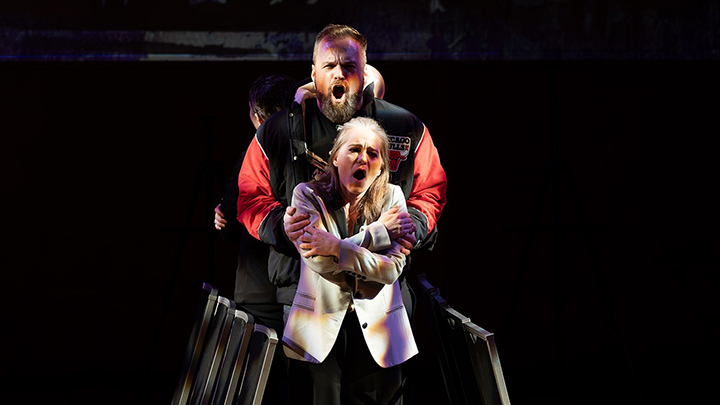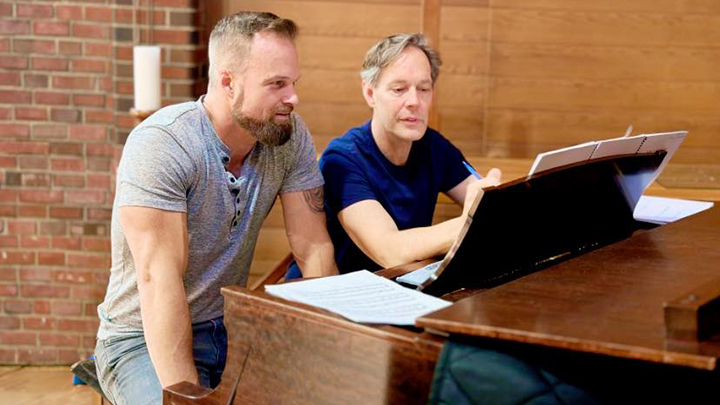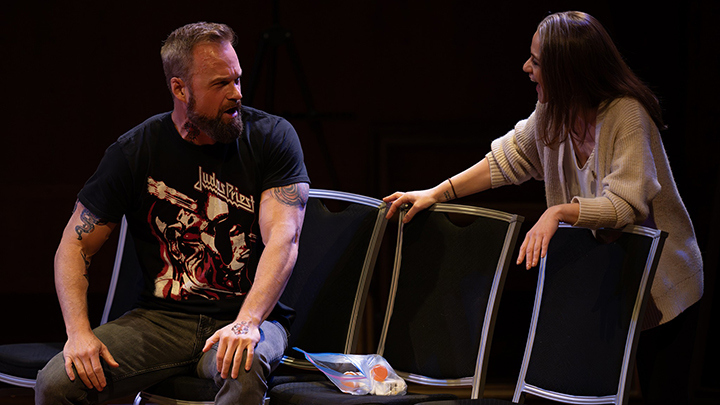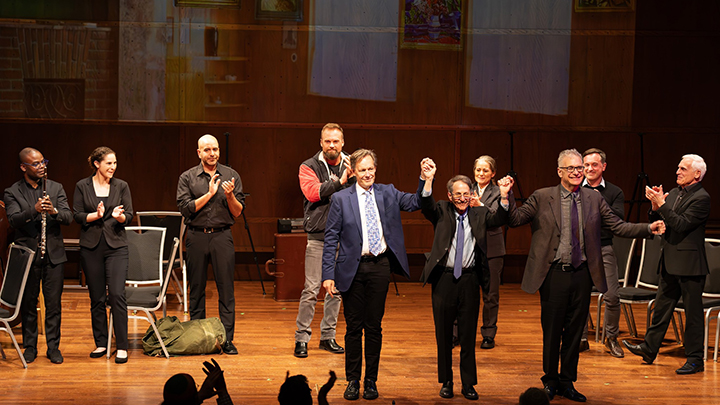
Shortly after his first opera Dead Man Walking opened the Metropolitan Opera’s season last September in a brand-new production, his latest Intelligence – inspired by the true story of two Civil War spies Elizabeth Van Lew and Mary Jane Bowser – graced Brown Theater to start Houston Grand Opera’s 2023-24 season. Next year, a new mounting of his much-acclaimed 2010 Moby Dick is scheduled to set sail at the Metropolitan Opera with a great cast led by Brandon Jovanovich as Captain Ahab.
Seemingly unfazed by all those big shows, last week Heggie, with his frequent collaborator, librettist Gene Scheer, unveiled a new one-act opera titled Before It All Goes Dark (shortened Dark, subsequently) with a three-city world premiere tour that started in Seattle on May 19, followed by San Francisco (seen on May 22) and ended in Chicago on May 25 and 26. Dark was commissioned by Music of Remembrance, a Seattle-based performing arts organization “focused on human rights and social justice … evolved from an initial focus on Holocaust remembrance to honoring the resilience of all people excluded or persecuted for their faith, ethnicity, gender or sexuality” as part of their 25thanniversary milestone. In fact, Dark marked Heggie’s fifth commission from Music of Remembrance, the first three being one-act operas on themes of persecution during the Holocaust, namely For a Look or a Touch (2007), Another Sunrise (2012), and Farewell, Auschwitz (2013). Heggie incorporated all three into a full-length opera Out of Darkness (2013), which Music of Remembrance premiered in 2016 and can be heard on Naxos recording. As a sidenote, Heggie extensively revised the work further and renamed it Two Remain, and the final work premiered at the Atlanta Opera in 2018.
Dark told the tragic real-life story of Gerald “Mac” McDonald, “a troubled and aging Vietnam veteran who learned that he was the sole heir to a priceless art collection stolen by the Nazis from a great-great uncle whom he’d never even heard of.” It was based on an article by Chicago Tribune journalist Howard Reich titled Mac’s Journey, which was published as two parts: “Confronting the ghosts of a looted past” and “Retracing a tragic course.” In the program, Music of Remembrance Artistic Director Mina Miller detailed the opera further, saying, “[the] opera takes us along on his arduous journey to Prague and beyond in search of this inheritance. We’re with him on a voyage of self-discovery as he absorbs the transformative power of art itself, and as he finds identity in the Jewish heritage that had been hidden from him.”
On Wednesday May 22, the presentation began with conversation among Heggie, Reich and Miller, discussing the creative process of creating the opera and its source. Reich was literally the person that discovered that Mac was the sole living descendent of Emil Freund, a prominent Jewish businessman killed by the Nazis in 1942. He even traveled with Mac to Prague and Lódz to chronicle the event – essentially living the scenes of the opera – and witnessed first-hand the transformative effects of encountering Freund’s 30 paintings and learning of his life and death. In fact, in the interview with Thomas May published by Seattle Times, Reich said: “This opened the door for me the next year to pursue the truth of my own family in ‘Prisoner of Her Past.’ So this experience changed both our lives.” (Prisoner of Her Past was the title of Reich’s memoir recounting his mother’s struggle with PTSD as a Holocaust survivor.)
?si=vK0WhX_ogN8NEHJI
On the creative side, Heggie explained that while Dark was based on Mac’s Journey, Scheer concocted the libretto from what made sense story-wise, including adding characters in the form of a concerned neighbor Sally, a curator at the Jewish Museum Misha, and, in the final scene, a personification of Freund himself; all of which were sang by the only other singer in the opera, a mezzo-soprano. Scheer himself appeared to agree with this point, as he mentioned in the interview above: “In this art form, we want to try to explore what something felt like. We’re really in the business of emotional archaeology.”
The need for a dramatic arc also resulted in one major shift in the timeline. Three weeks after Reich’s articles broke out, the Czech Republic decided to declare Freund’s art collection a national treasure that would not be allowed to leave the country. The real-life Mac found out about this prior to his journey, while in the opera Mac heard the news after he was transfixed by the paintings and transformed by the experience, making the almost wordless final scene between him and the ghost of his great-great uncle even more poignant and justifying the title of the opera. Mac himself passed away three years after his trip, at the age of 55.
Scheer’s libretto was truly a great asset in this one-act opera with five interconnected scenes. Given the nature of the story, it was definitely easy to turn the narrative into one soliloquy after another, as the opera almost entirely took the point of view of Mac’s inner thoughts and reactions. Nevertheless, one of the most heartbreaking monologues was surprisingly assigned to Misha when she was describing why she stayed in Prague. The tender tone and the economy of words – just in a couple short sentences – really opened the eyes of not just Mac but also the audience to the idea of belonging and it strongly marked the turning point of the opera.
Miller had the brilliant idea to pair Dark with “chamber music salon in Freund’s lavish apartment”, which prefaced the opera during Wednesday’s presentation. She curated a program by a few Czech composers who would ultimately perish in the camps, including a piece each by David Beigelman and Robert Dauber (his sole surviving composition Serenata for Violin and Piano) and five short excerpts from various pieces by Erwin Schulhoff, played gloriously by the members of the instrumental ensemble drawn from the Seattle Symphony; some had even performed with Music of Remembrance since its founding. This was such a great idea, for not only it set the mood for the audience, but, in a way, also foretold the conclusion of the opera, where it all went dark for both Mac and Freund.
The “chamber music salon” part (especially Schulhoff’s pieces) also served another purpose, giving the audience a taste of the sound world of Heggie’s score. Peter Demetz in his book Prague in Danger: The Years of German Occupation, 1939–45 called Schulhoff as “one of the first generation of classical composers to find inspiration in the rhythms of jazz music.” (In fact, one of the excerpts was the “Tango” movement of his Suite dansate en jazz for piano.) Heggie seemed to be inspired by the music of that era, and similarly he interpolated many jazz elements in his scoring for the seven instruments, particularly in the jaggedly syncopated opening theme (Heggie’s operatic adaptation of Mac’s heavy metal music) that permeated the score from time to time, while retaining his distinguishable soaring vocal lines. Heggie himself seemed to agree, as he said in the interview above: “Before It All Goes Dark is not like anything I’ve ever done. It starts off with this very aggressive musical texture but then is overcome by the world of art Mac discovers and his sense of identity and connection.”
Unlike the first four of Music of Remembrance’s commissions, the idea of Dark as an opera didn’t come from Miller. It was not hard to see why the plight of Mac’s circumstances appeal to Heggie; his operatic oeuvre was filled with characters on a self-discovery journey, from Joseph de Rocher in Dead Man Walking, Arden Scott in 2015 Great Scott, all the way to George Bailey in his 2016 adaptation of Frank Capra’s It’s a Wonderful Life. The character Mac was a fine addition to the list, as his spiritual quest once again reemphasized what often attributed to Ralph Waldo Emerson that “life is a journey, not a destination.”
Given the long history of association between Heggie/Scheer and Music of Remembrance, it was not surprising that the creative team for this world premiere tour was assembled among friends, all of which were veterans of their operas and familiar with their idioms. Conductor Joseph Mechavich, who has conducted most of Heggie’s operas, led the instrumentalists in a reading full of excitement and clarity, making sure each instrument was fully heard while keeping the story moving forward. In his reading, the score wasn’t simply just background music, but it played an active role in the drama, especially in the instrumental parts that connected the scenes. One of the most astonishing such moments was the instrumental played after Mac visited Freund’s house, where the music, coupled with the visuals of inside a train, chillingly demonstrated the horrors of being transported to camps!
Speaking of visuals, director Erich Parce and media designer Peter Crompton staged the opera delightfully and respectfully using the simplest means, just some rows of chairs and some empty frames, while relying heavily on the projected visuals. But what a marvel Crompton’s projections were… from Freund’s salon adorned with said paintings to Mac’s decaying apartment, all the way to the Jewish Museum in Prague. The presentation of the paintings was nothing short of pure genius: one by one the paintings were presented with a bright yellow glow in the background, as if the audience was seeing them through Mac’s eyes and equally transformed! Meanwhile, Parce directed the movement naturally and sensitively, nothing felt forced and exaggerated. The clever ways of the rows of chairs being used throughout were a sight to behold, a true testament of how much thought was put in designing the stage.
Nevertheless, the greatest contributions to the success of this premiere tour were the two soloists, both of whom gave their heart and soul to bring the story to life. Heggie wrote the role of Mac for bass-baritone Ryan McKinny, who had tremendous success as Joseph de Rocher in the Met production of Dead Man Walking and brought that same ferocious intensity to his role here, portraying Mac as a tough and proud down-on-his-luck guy. Clad in a Judas Priest T-shirt throughout, his voice sounded round and sonorous, and he enunciated the words clearly. Most importantly, McKinny treated the role with respect and dignity; he refused to turn it into caricature of self-pity and despair. McKinny’s reading also was full of nuances, from sweet and heartbreaking in the scene with Misha, to full-blown anger when he found out that he was being looted (again)!
Equally impressive was mezzo-soprano Megan Marino, who portrayed three different roles Sally, Misha and Emil Freund. With her acting and her voice, she successfully gave each role an identity; brash and concerned as Sally, sympathetic and caring as Misha, and almost playful as Emil (she played Emil Freund twice actually, as a host during the “chamber music salon” part, and at the very end of the opera). As mentioned before, her monologue about her mother and why she stayed was truly heartbreaking, as Marino herself was close to tears performing it. Moreover, the roles were pretty physical for her as she even had to change clothes and adjust her appearance towards the back of the stage between the scenes!
This was truly a tremendous achievement for Heggie, Scheer, Music of Remembrance and all the people involved. I could only wish that the opera would reach a bigger audience in the future, for it not only teaches the dangers of letting history repeating itself, but also it demonstrates the transformative power of Art, right at the time when the Art world around the globe is in crisis and needs much support!
Photos: Music of Remembrance Facebook Page





























Comments